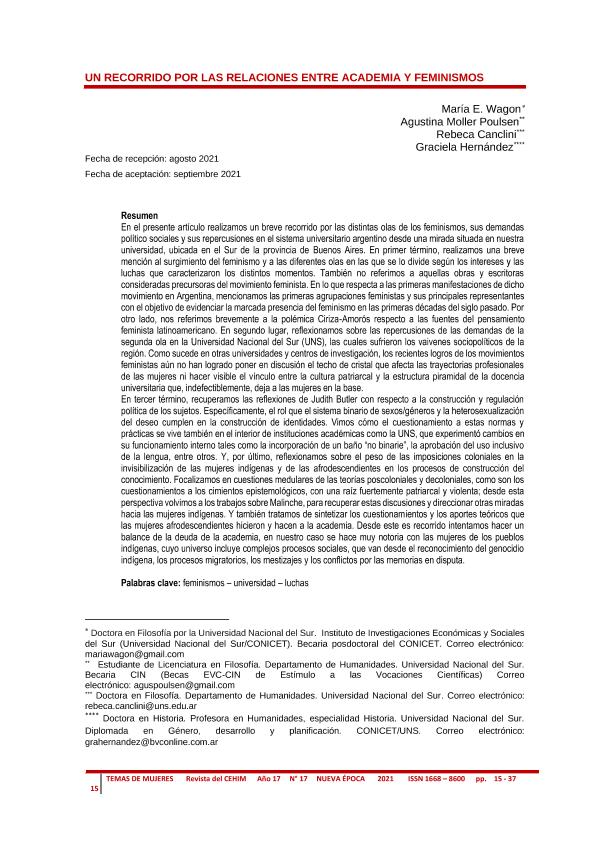Mostrar el registro sencillo del ítem
dc.contributor.author
Wagon, María Elena

dc.contributor.author
Moller Poulsen, Agustina
dc.contributor.author
Canclini, Rebeca Isabel

dc.contributor.author
Hernandez, Graciela Beatriz

dc.date.available
2022-06-24T14:25:32Z
dc.date.issued
2021-12
dc.identifier.citation
Wagon, María Elena; Moller Poulsen, Agustina; Canclini, Rebeca Isabel; Hernandez, Graciela Beatriz; Un recorrido por las relaciones entre academia y feminismos; Universidad Nacional de Tucumán. Facultad de Filosofía y Letras; Temas de Mujeres; 17; 17; 12-2021; 15-37
dc.identifier.uri
http://hdl.handle.net/11336/160486
dc.description.abstract
En el presente artículo realizamos un breve recorrido por las distintas olas de los feminismos, sus demandas político sociales y sus repercusiones en el sistema universitario argentino desde una mirada situada en nuestra universidad, ubicada en el Sur de la provincia de Buenos Aires. En primer término, realizamos una breve mención al surgimiento del feminismo y a las diferentes olas en las que se lo divide según los intereses y las luchas que caracterizaron los distintos momentos. También no referimos a aquellas obras y escritoras consideradas precursoras del movimiento feminista. En lo que respecta a las primeras manifestaciones de dicho movimiento en Argentina, mencionamos las primeras agrupaciones feministas y sus principales representantes con el objetivo de evidenciar la marcada presencia del feminismo en las primeras décadas del siglo pasado. Por otro lado, nos referimos brevemente a la polémica Ciriza-Amorós respecto a las fuentes del pensamiento feminista latinoamericano. En segundo lugar, reflexionamos sobre las repercusiones de las demandas de la segunda ola en la Universidad Nacional del Sur (UNS), las cuales sufrieron los vaivenes sociopolíticos de la región. Como sucede en otras universidades y centros de investigación, los recientes logros de los movimientos feministas aún no han logrado poner en discusión el techo de cristal que afecta las trayectorias profesionales de las mujeres ni hacer visible el vínculo entre la cultura patriarcal y la estructura piramidal de la docencia universitaria que, indefectiblemente, deja a las mujeres en la base.
dc.description.abstract
In this article we make a brief tour of the different waves of feminisms, their political and social demands and their repercussions on the Argentine university system from a perspective located in our university, located in the South of the province of Buenos Aires. In the first place, we make a brief mention of the emergence of feminism and the different waves in which it is divided according to the interests and struggles that characterized the different moments. We also do not refer to those works and writers considered precursors of the feminist movement. With regard to the first manifestations of this movement in Argentina, we mention the first feminist groups and their main representatives with the aim of evidencing the marked presence of feminism in the first decades of the last century. On the other hand, we refer briefly to the Ciriza-Amorós polemic regarding the sources of Latin American feminist thought. Secondly, we reflect on the repercussions of the demands of the second wave in the UNS, which suffered the socio-political ups and downs of the region. As in other universities and research centers, the recent achievements of feminist movements have not yet managed to put into question the glass ceiling that affects women's professional trajectories or make visible the link between patriarchal culture and the pyramidal structure of university teaching that, unfailingly, leaves women at the base. Third, we recover the reflections of Judith Butler regarding the construction and political regulation of subjects. Specifically, the role that the binary system of sexes/genders and the heterosexualization of desire play in the construction of identities. We saw how the questioning of these norms and practices is also experienced within academic institutions such as the UNS, which experienced changes in its internal functioning such as the incorporation of a "non-binary" bathroom, the approval of the inclusive use of the language, among others. And finally, we reflect on the weight of colonial impositions in the invisibility of indigenous women and Afrodescendants in the processes of knowledge construction. We focus on core issues of postcolonial and decolonial theories, such as questioning the epistemological foundations, with a strongly patriarchal and violent root; from this perspective we returned to the work on Malinche, to recover these discussions and direct other perspectives towards indigenous women. And we also try to synthesize the questions and theoretical contributions that Afrodescendant women made and make to the academy. From this tour we try to take stock of the debt of the academy, in our case it becomes very noticeable with the women of the indigenous peoples, whose universe includes complex social processes, ranging from the recognition of the indigenous genocide, the migratory processes, the miscegenations and the conflicts for the memories in dispute.
dc.format
application/pdf
dc.language.iso
spa
dc.publisher
Universidad Nacional de Tucumán. Facultad de Filosofía y Letras
dc.rights
info:eu-repo/semantics/openAccess
dc.rights.uri
https://creativecommons.org/licenses/by-nc-sa/2.5/ar/
dc.subject
FEMINISMOS
dc.subject
UNIVERSIDAD
dc.subject
LUCHAS
dc.subject.classification
Otras Humanidades

dc.subject.classification
Otras Humanidades

dc.subject.classification
HUMANIDADES

dc.title
Un recorrido por las relaciones entre academia y feminismos
dc.type
info:eu-repo/semantics/article
dc.type
info:ar-repo/semantics/artículo
dc.type
info:eu-repo/semantics/publishedVersion
dc.date.updated
2022-05-17T12:52:55Z
dc.identifier.eissn
1668-8600
dc.journal.volume
17
dc.journal.number
17
dc.journal.pagination
15-37
dc.journal.pais
Argentina

dc.journal.ciudad
San Miguel de Tucumán
dc.description.fil
Fil: Wagon, María Elena. Consejo Nacional de Investigaciones Científicas y Técnicas. Centro Científico Tecnológico Conicet - Bahía Blanca. Instituto de Investigaciones Económicas y Sociales del Sur; Argentina
dc.description.fil
Fil: Moller Poulsen, Agustina. Universidad Nacional del Sur. Departamento de Humanidades; Argentina
dc.description.fil
Fil: Canclini, Rebeca Isabel. Universidad Nacional del Sur. Departamento de Humanidades; Argentina
dc.description.fil
Fil: Hernandez, Graciela Beatriz. Universidad Nacional del Sur. Departamento de Humanidades; Argentina. Consejo Nacional de Investigaciones Científicas y Técnicas. Centro Científico Tecnológico Conicet - Bahía Blanca; Argentina
dc.journal.title
Temas de Mujeres
dc.relation.alternativeid
info:eu-repo/semantics/altIdentifier/url/http://ojs.filo.unt.edu.ar/index.php/temasdemujeres
dc.relation.alternativeid
info:eu-repo/semantics/altIdentifier/url/http://ojs.filo.unt.edu.ar/index.php/temasdemujeres/article/view/488
Archivos asociados
